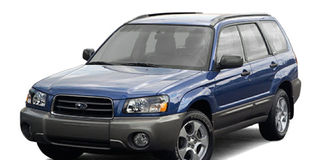What is the fuel economy of the 2003 Subaru Forester?

Hello Paul, please give me some advice regarding Subaru Forester 2003 model with turbo in regards to fuel consumption and maintenance. Matovu
Hello Matovu, the 2003 second generation Subaru Forester comes with 2.0 and 2.5 litre petrol engines both offering naturally aspirated and turbo charged options. If you are concerned about fuel consumption, maintenance cost as well as performance you need to know the difference between the two engine sizes as well as how they score with regards to the above concerns.
The smaller Subaru EJ20 2.0 litre engine will generally provide better fuel economy, lower maintenance costs with lower engine power or performance when compared with the bigger EJ25 2.5 litre engine. However, even the EJ20 2.0 litre engine has different variants. The EJ20E non turbo with lighter SOHC (Single Overhead Camshaft) delivers less prompt power (138HP) but is more fuel efficient at cruising speed and easier to maintain or repair compared to the 153HP EJ20D with DOHC (Double Overhead Camshaft) valve train architecture is heavier and more complicated to repair.
On the other hand, the EJ20D 2.0 litre DOHC engine gives more prompt performance and fuel efficiency at lower revs because of better volumetric air intake thanks to bigger intake valves and allows more efficient centre positioning of spark plugs. The EJ20T Turbo charged 2.0 litre engine has two variants; the non STi, which delivers 177HP and the STi, which delivers 219HP.
Quite interestingly, the turbo charged engine uses forced air induction to improve low end performance and fuel economy while providing overall superior engine power output. Turbo charging improves the power capacity of the lower displacement 2.0 litre engines (177HP / 219HP) and gives them a performance benefit to exceed the larger or bigger displacement non turbo 173HP 2.5 litre engine. The turbo charged EJ25 2.5 litre engine delivers 224HP.
With turbo charged engines, one must follow a high maintenance regime for oil and filter change as well as observing turbo cooling protocols to avoid costly damage. Fuel economy is not only influenced by engine size or technology. Fuel efficiency can be influenced by other factors such as driving experience and style, type of gear transmission and choice of fuel. Aggressive driving style with frequent kick downs, sudden braking and delayed gear shifts will give you exciting performance at the cost of fuel economy.
Generally, manual gearboxes provide better fuel economy if the driver of a vehicle is skilful to shift up quickly. Choice of differentiated fuels designed with performance and efficiency enhancing additives will improve your fuel economy while reducing your maintenance costs by keeping your engine fuel system clean.




